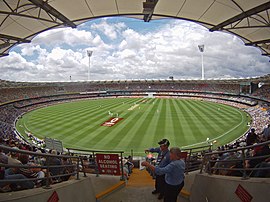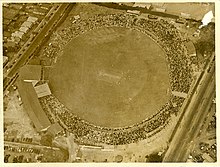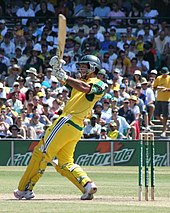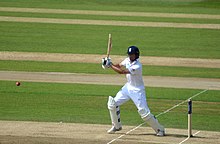
A | B | C | D | E | F | G | H | CH | I | J | K | L | M | N | O | P | Q | R | S | T | U | V | W | X | Y | Z | 0 | 1 | 2 | 3 | 4 | 5 | 6 | 7 | 8 | 9
| The Gabba | |||||||||||||||||
 | |||||||||||||||||
| Ground information | |||||||||||||||||
|---|---|---|---|---|---|---|---|---|---|---|---|---|---|---|---|---|---|
| Location | Woolloongabba, Queensland, Australia | ||||||||||||||||
| Coordinates | 27°29′9″S 153°2′17″E / 27.48583°S 153.03806°E | ||||||||||||||||
| Establishment | 1895 | ||||||||||||||||
| Capacity | 37,000[2] 37,478 approx (Australian rules football)[3][4] | ||||||||||||||||
| Owner | Queensland Government | ||||||||||||||||
| Operator | Stadiums Queensland | ||||||||||||||||
| Tenants | Queensland Bulls Brisbane Lions (AFL) Brisbane Heat (BBL) & (WBBL) | ||||||||||||||||
| End names | |||||||||||||||||
| Stanley Street End (south) Vulture Street End (north) | |||||||||||||||||
| International information | |||||||||||||||||
| First Test | 27 November – 3 December 1931: | ||||||||||||||||
| Last Test | 25–28 January 2024: | ||||||||||||||||
| First ODI | 23 December 1979: | ||||||||||||||||
| Last ODI | 19 January 2018: | ||||||||||||||||
| First T20I | 9 January 2006: | ||||||||||||||||
| Last T20I | 1 November 2022: | ||||||||||||||||
| First women's Test | 1–4 January 1985: | ||||||||||||||||
| Last women's Test | 15–17 February 2003: | ||||||||||||||||
| First WODI | 16 January 1993: | ||||||||||||||||
| Last WODI | 17 January 1993: | ||||||||||||||||
| Team information | |||||||||||||||||
| |||||||||||||||||
| As of 28 January 2024 Source: ESPNcricinfo | |||||||||||||||||
The Brisbane Cricket Ground, commonly known as the Gabba,[5][6] is a major sports stadium in Brisbane, the capital of Queensland, Australia. The nickname Gabba derives from the suburb of Woolloongabba, in which it is located. Over the years, the Gabba has hosted athletics, Australian rules football, baseball, concerts, cricket, cycling, rugby league, rugby union, Association football and pony and greyhound racing. At present, it serves as the home ground for the Queensland Bulls in domestic cricket, the Brisbane Heat of the Big Bash League and Women's Big Bash League, and the Brisbane Lions of the Australian Football League. It is also the secondary home of the Brisbane Broncos of the National Rugby League. The stadium will receive a refurbishment for the 2032 Summer Olympics and Paralympics.[7]
Between 1993 and 2005, the Gabba was redeveloped in six stages at a cost of A$128,000,000. The dimensions of the playing field are now 170.6 metres (560 feet) (east-west) by 149.9 metres (492 feet) (north-south), to accommodate the playing of Australian rules football at elite level. The seating capacity of the ground was 42,000 in 2010, which has been reduced in recent times due to new electronic scoreboards and corporate facilities.[8] For international cricket matches, the capacity is reduced to 36,000 due to new scoreboards and the addition of a pool deck, as well as wider sight screens.[9] For AFL matches the capacity is slightly larger at 37,478.[3][4]
History
Foundation

The land on which the ground sits was set aside for use as a cricket ground in 1895 and the first match was held on the site on 19 December 1896, between Parliament and The Press. Prior to this, cricket was played at a ground in the area then known as Green Hills (beside Countess Street Petrie Terrace opposite the Victoria Barracks – now occupied by the Northern Busway),[10] since at least the early 1860s.[11]

Greyhound racing meetings were held during 1928 at the ground.[12]
The Gabba shared first-class cricket matches with the Exhibition Ground until 1931. The first Sheffield Shield match at the Gabba was scheduled to be played between 31 January 1931 and 4 February 1931, but it was washed out without a ball being bowled. The first Test match at the Gabba was played between Australia and South Africa between 27 November and 3 December 1931.
In 1972, a greyhound track was installed at The Gabba with night meetings held weekly at the ground for 21 years.[13]

Expansion
From February 1993, work commenced on turning The Gabba into an all-seater stadium. The last greyhound meeting was held at The Gabba on 5 February 1993, with work commencing shortly after to remove the greyhound track around the ground to accommodate the relocation of the Brisbane Bears from Carrara (on the Gold Coast) to The Gabba, renovating the Sir Gordon Chalk Building to house the Bears Social Club and change rooms, refurbishing the Clem Jones stand (named for the long-standing Mayor of Brisbane, Clem Jones), the construction of a new Western grandstand, and extending the playing surface to cater for Australian rules football.The work was largely completed by 11 April when the Bears hosted their first AFL game at the renovated venue against Melbourne in front of 12,821 spectators.[14]
Subsequent further renovations at the ground commencing in 1995 saw the current two tier stands constructed in stages with the last stage completed in 2005 when the Brisbane Lions Social Club (formerly the Brisbane Bears Social Club) was demolished and replaced with a 24 bay grandstand spread over 3 levels of seating with the entire redevelopment costing $AU128 million.[15] Also as part of the redevelopment, five light towers were installed to allow for night football and cricket matches to take place, a light tower at the school end was removed in the late 90s to make way for the expanded grandstands. In mid-2020 the Gabba received a $35 million refurbishment of the stadium's media and corporate facilities, as well as entrances and spectator amenities.[16] The work was completed in October that year, shortly before the venue hosted the 2020 AFL Grand Final.[17]
2032 Summer Olympics and cancelled reconstruction
In April 2021, Premier of Queensland Annastacia Palaszczuk announced plans for a $1 billion reconstruction of the Gabba to serve as the main stadium of the 2032 Summer Olympics if Brisbane were awarded the Games, with an intent to host the ceremonies and athletics. The stadium's foundations would have been demolished and rebuilt with new grandstands, expanding it to a capacity of 50,000. A new pedestrian plaza would have also been constructed.[18] The redevelopment would have necessitated the demolishment of heritage-listed East Brisbane State School, one of Brisbane's oldest state primary schools; it was established in 1899 on the eastern-most end of the block of land that now includes the Gabba.[19]
In February 2023, the state and federal government reached an agreement on the Gabba and Brisbane Live arena projects, totalling $7 billion; the cost of the Gabba project had increased to $2.7 billion, which would be paid entirely by the state.[19] The Gabba project proved controversial due to its costs. In September 2021, Ted O'Brien—LNP of Queensland MP and newly appointed special envoy for Brisbane 2032—argued that the redevelopment was announced without consultation, explaining that "the problem was we were selling a proposition to the International Olympic Committee about the 'new norms'; no big, new, flashy, glossy investments", and that "we had a lot of work to claw back with the IOC to make sure they didn't think we were telling them one thing and planning to do something else."[20][21]
Scrutiny grew after Victoria withdrew its hosting of the 2026 Commonwealth Games due to cost concerns. In August 2023, Matt Carroll of the Australian Olympic Committee told a senate committee that the IOC recommends against building infrastructure solely for the Olympics, and that cricket and the Brisbane Lions would remain the Gabba's primary uses.[22] In December 2023, Lord Mayor Adrian Schrinner withdrew his support for the Gabba project, stating that Brisbane 2032 had "become more about overpriced stadiums rather than the promise of vital transport solutions."[23][24] Queensland had announced plans for a 20,000-seat stadium at the Brisbane Showgrounds at a cost of $137 million, with the intent to use it as a temporary venue for the Gabba's tenants during construction.[24] Schrinner, who was not given advance notice of the Showgrounds project, stated that "the state government's ham-fisted and foolish attempt to extort Brisbane ratepayers for tens of millions of dollars for a new RNA stadium was the final straw."[24]
The new Premier of Queensland Steven Miles (who took office unopposed after Palaszczuk retired from politics)[25] announced that he would instate an infrastructure authority to oversee the development of Brisbane 2032's venues, and that an independent review of its plans would be led by former Lord Mayor Graham Quirk and completed within the next 60 days.[26][27] In January 2024, Miles stated that despite his previous support of the stadium plans as an assistant minister, he was concerned over the $2.7 billion cost of the stadium project, and that "I repeatedly asked if there were any other options, and all the options that were brought back cost similar amounts for a worse outcome."[28][29]
On 18 March 2024, as a result of the independent review, Miles announced that the Gabba project had been cancelled. It will still undergo a refurbishment ahead of the Games, but will no longer serve as the ceremonies and athletics venue.[30] The review recommended the construction of a new 55,000-seat stadium in Victoria Park as a legacy project, but Miles stated that this proposal has been rejected due to its projected $3.4 billion cost. Instead, Miles announced that Lang Park (which is already scheduled to host rugby sevens and football) would serve as the ceremonies' venue instead, and Queensland Sport and Athletics Centre would host athletics. Both venues, as well as the Gabba, are still expected to be refurbished.[30] Miles stated that he wanted Brisbane 2032 to be a "low-cost Games", and that "when Queenslanders are struggling with housing and other costs, I cannot justify to them spending $3.4 billion on a new stadium."[30] The state government spent $6.4 million on project validation reports tied to the scrapped project, which Miles stated would be "used to inform future works on the Gabba".[31]
Sports played at the ground
Cricket



The Gabba is used from October to March for cricket and is home to the Queensland Cricket Association, the Queensland Cricketers Club, Brisbane Heat and the Queensland Bulls cricket teams. The venue usually hosts the first test match of the season each November, in addition to a number of international one-day matches usually held in January. The pitch is usually fast and bouncy.[citation needed]
The Gabba's amenities were greatly improved in the 1980s from a very basic standard, especially in comparison with other Australian cricket grounds. Test cricket was first played at the ground in November 1931, when the first test of the series between Australia and South Africa was held there. In December 1960, Cricket's first-ever tied test took place at the ground, when Richie Benaud's Australian team tied with Frank Worrell's West Indian side.[32] Queensland clinched its first-ever Sheffield Shield title with victory over South Australia in the final at the ground in March 1995.[33]
The Gabba was the first Australian venue to host an international Twenty20 cricket match.[34]
In November 1968 Colin Milburn scored 243, including 181 in the two-hour afternoon session, in a Sheffield Shield match for Western Australia vs. Queensland.[35][importance?]
As of June 2023, Australia's Michael Clarke holds the record for the highest number of runs scored in one test innings at the Gabba with 259 not out, breaking the previous record set by Alastair Cook.[36]
Australia has a formidable test match record at the ground. In the 55 matches played there, Australia has won 33, drawn 13, tied 1 and lost 9. The last loss came on 19 January 2021 against India in the 4th and final test of the 2020–21 Border-Gavaskar trophy.[37] India became the first Asian team to win a Test match at the Gabba.[38] This was Australia's first loss at the Gabba in 29 matches, and 32 years. England have a notoriously poor record at The Gabba, and have only won two test matches at the ground since the end of the Second World War. Many of their defeats have been heavy[39] and only seven England players have scored centuries at the ground.
On 15 December 2016, Australia hosted Pakistan for the first day-night Test at the Gabba,[40] and the first Australian day-night Test hosted outside the Adelaide Oval.
Australian rules football



Australian football has a long association with the ground. The Queensland Football League, a precursor to AFL Queensland played matches at the Gabba from 1905 to 1914, 1959 to 1971, and in the late 1970s and early 1980s. AFLQ matches resumed in 1993 as curtain-raiser events to AFL games, along with occasional AFLQ Grand Finals.[citation needed]
The first VFL/AFL game at The Gabba was held on June 28, 1981, with Hawthorn hosting Essendon in front of 20,351 spectators.[41] Six years later, the Brisbane Bears were admitted into the VFL but would initially play their home games at Carrara Stadium on the Gold Coast. The Brisbane Bears experimented with playing four matches at the Gabba in Brisbane in 1991, before moving all home matches to the venue ahead of the 1993 season. The Gabba was then the official home ground for the Brisbane Bears from 1993 to 1996 and since 1997 has been the home of the Brisbane Lions after the Bears merged with Fitzroy. The record crowd for an Australian rules football match is 37,473 between the Brisbane Lions and Richmond in the 2019 second qualifying final.[42]
Interstate games, including the 1961 national carnival have also been played there, as was a demonstration game during the 1982 Commonwealth Games. In 1991 the Gabba was host to Queensland's only victory over a Victorian side. In 1998 the Gabba hosted an AFL State of Origin match between the Allies and Victoria. [citation needed]
The Gold Coast Suns have hosted games at The Gabba in 2011 and in 2018 due to the unavailability of their home ground Carrara Stadium because of redevelopment and the 2018 Commonwealth Games respectively.[citation needed] In addition, Melbourne FC played an annual home game against Brisbane at The Gabba between 2001 and 2007.[43]
During the 2020 AFL season, the Gabba hosted a greater number of home and away matches than usual, due to the temporary relocation of Victorian and other clubs as a result of the COVID-19 pandemic. The venue was also selected to host the 2020 AFL Grand Final, with the Melbourne Cricket Ground not capable of hosting any spectators at the match. The Gabba thus became the first stadium outside the state of Victoria to host a VFL/AFL Grand Final, which Richmond won against Geelong by 12.9 (81) to 7.8 (50) in front of 29,707 people – just under the venue's temporary maximum capacity due to the pandemic.[44] Since the MCG began hosting VFL/AFL Grand Finals (VFL until 1989, AFL afterwards), only four other venues had done so: Princes Park (1942, 1943 and 1945), the St Kilda Cricket Ground (1944), Waverley Park (1991), and Optus Stadium (2021).[citation needed]
Soccer
In the early 1900s, the Gabba hosted numerous matches between Australia and various touring nations.[45] During the 1950s and 1960s the Gabba hosted soccer matches for English first division and Scottish clubs including Blackpool FC, Everton FC, Manchester United and Heart of Midlothian F.C.[46] The Chinese and South African national teams also played at the ground. During the 2000 Summer Olympics, the Gabba hosted association football group games.[47]
Rugby league
On 8 May 1909, the first match of rugby league was played in Brisbane at the Gabba. Norths played against Souths before a handful of spectators at the ground.[48] Brisbane Rugby League games continued to be played occasionally at The Gabba until 1957.[49]
The Gabba hosted its first rugby league Test match on 26 June 1909, when Australia defeated New Zealand Māori 16–13.[50]
The Queensland Rugby league team hosted a match of the 1953 American All Stars tour of Australia and New Zealand at the Brisbane Cricket Ground.[citation needed]
The Kangaroos continued to play Tests at this venue until 1956, and a ground record crowd of 47,800 people saw Australia play Great Britain in 1954. From 1932 to 1957 the Gabba was also used to host interstate matches and International Rugby League Finals from 1909 – 1956.[citation needed]
Rugby League did not return to The Gabba until July 1, 2023, when the Brisbane Broncos moved three of their matches to the ground while their regular home ground Suncorp Stadium was unavailable due to the 2023 FIFA Women's World Cup.[51] The first NRLW game at the ground was played on July 27, 2023, when the Brisbane Broncos took on the Gold Coast Titans as a curtain raiser to the Men's game between the Broncos vs the Sydney Roosters.[citation needed]
Rugby league test matches
The Gabba hosted 11 rugby league test matches between 1912 and 1956.[52]
| Date | Home team | Opponents | Result | Attendance | Part of |
|---|---|---|---|---|---|
| 14 August 1909 | 16–13 | 8,000 | 1909 Māori tour | ||
| 6 July 1912 | 13–10 | 8,000 | 1912 Trans-Tasman Test series | ||
| 18 June 1932 | 15–6 | 15,944 | 1932 Ashes series | ||
| 4 July 1936 | 7–12 | 29,486 | 1936 Ashes series | ||
| 12 June 1948 | 13–4 | 23,014 | 1948 Trans-Tasman Test series | ||
| 1 July 1950 | 15–3 | 35,000 | 1950 Ashes series | ||
| 30 June 1951 | 23–11 | 35,000 | 1951 French rugby league tour of Australia and New Zealand | ||
| 28 June 1952 | 29–45 | 29,243 | 1952 Trans-Tasman Test series | ||
| 9 July 1954 | 21–38 | 46,355 | 1954 Ashes series (All time Gabba attendance record) | ||
| 2 July 1955 | 28–29 | 45,745 | 1955 French rugby league tour of Australia and New Zealand[53] | ||
| 23 June 1956 | 8–2 | 28,361 | 1956 Trans-Tasman Test series |
Rugby union
The Gabba has hosted six rugby union Test matches.
| Year | Home team | Result | Opponents | Crowd |
|---|---|---|---|---|
| 1907 | 5–14 | not known | ||
| 1914 | 0–17 | |||
| 1950 | 6–19 | |||
| 1951 | 6–16 | |||
| 2001 | 13–29 | 37,460 | ||
| 2002 | 38–27 | 37,258 |
2000 Olympic Games
The Gabba hosted seven games of the 2000 Olympic Games Men's Football tournament including a Quarter final match.
| Date | Time (AEST) | Team #1 | Result | Team #2 | Round | Attendance |
|---|---|---|---|---|---|---|
| 13 September 2000 | 19:00 | 3–2 | Group C | 26,730 | ||
| 14 September 2000 | 19:00 | 3–1 | Group D | 24,616 | ||
| 16 September 2000 | 19:00 | 2–3 | Group C | 22,182 | ||
| 17 September 2000 | 19:00 | 1–3 | Group D | 36,326 | ||
| 19 September 2000 | 19:00 | 1–1 | Group C | 23,442 | ||
| 20 September 2000 | 19:00 | 1–0 | Group D | 36,608 | ||
| 23 September 2000 | 19:00 | 1–2 (a.e.t.) | Quarter final 2 | 37,332 |
Greyhound racing
Greyhound racing was also conducted at the Gabba prior to the redevelopment.[13] Meetings were held during 1928 and again from 1972 until 1993.[12]
Awards
In 2009, as part of the Q150 celebrations, the Gabba was announced as one of the Q150 Icons of Queensland for its role as a "structure and engineering feat".[54]
Largest crowds at the Gabba
| Sport | Date | Crowd | Event |
|---|---|---|---|
| Concerts | 4–5 March 2017 | 60,000 | Adele Live 2017 |
| Rugby league | 9 July 1954 | 46,355 | Ashes Australia vs Great Britain |
| Concerts | 6 November 2018 | 43,907 | Taylor Swift's Reputation Stadium Tour |
| International cricket | 9 January 2006 | 38,894 | 2005–06 T20 International: Australia vs South Africa |
| Australian rules football | 7 September 2019 | 37,478 | 2019 AFL Qualifying Final: Brisbane Lions vs Richmond |
| Rugby union | 30 June 2001 | 37,460 | 2001 British & Irish Lions tour to Australia: British & Irish Lions vs Australia |
| Soccer | 23 September 2000 | 37,332 | 2000 Olympic Football (men's) Brazil vs Cameroon |
| Domestic cricket (Big Bash League) | 5 January 2018 | 35,564 | 2017–18 BBL Season: Brisbane Heat vs Perth Scorchers |
Test cricket records

Batting
| Runs | Player | Period |
|---|---|---|
| 1,335 (26 innings) | 1996–2012 | |
| 1,030 (13 innings) | 2004–2013 | |
| 1,006 (11 innings) | 1974–1983 | |
| 963 (19 innings) | 2011–2022 | |
| 915 (26 innings) | 1986–2003 |



| Runs | Player | Period |
|---|---|---|
| 443 (8 innings) | 2006–2017 | |
| 314 (6 innings) | 1984–1992 | |
| 298 (8 innings) | 1978–1990 | |
| 278 (3 innings) | 1985–1987 | |
| 257 (4 innings) | 1933–1936 | |
| 257 (5 innings) | 1968–1984 |

